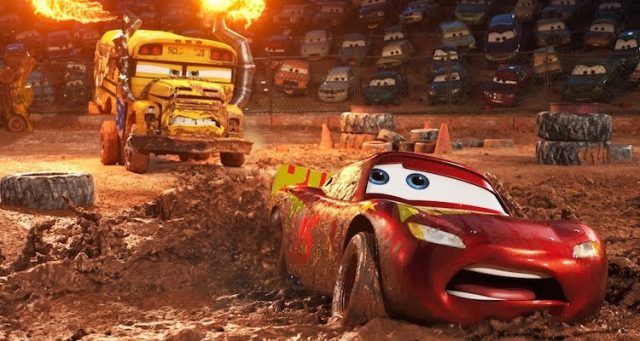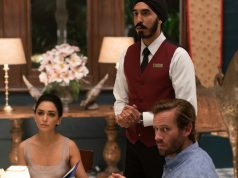
Pixar’s first bad movie, “Cars 2,” erred in making Mater the tow truck the main character and in emphasizing a tired espionage caper over jokes. Pixar’s second bad movie, “Cars 3,” fixes those mistakes and replaces them with different ones. This time, the accursed Mater is hardly around at all (and the film seems apologetic when he is), and instead of a spy adventure it’s a boring existential drama about an aging racer’s fear of obsolescence. Whee! Vrooom!
Pretending (as far as I can tell without re-watching “Cars 2”) that “Cars 2” did not happen, “Cars 3,” has champion racer Lightning McQueen (voice of Owen Wilson) still (or possibly again? I don’t remember) at the top of his game. But a new challenger has emerged: Jackson Storm (Armie Hammer, wasted), a sleeker, faster rookie whose modern design and state-of-the-art training practices could spell the end for old-timers like Lightning McQueen.
But Lightning McQueen will not be forced into retirement! “I decide when I’m done,” he says resolutely, as if rubbing it in our faces that Pixar will never stop making “Cars” movies. Lightning reluctantly teams up with a new high-tech sponsor, Sterling (Nathan Fillion), who gives him a perky female trainer, Cruz Ramirez (Cristela Alonzo), who puts him through his paces like a spin-class instructor (“And merge! And yield! And merge. And yield!”) Missing his old mentor, Doc Hudson (Paul Newman, resurrected for a few lines), Lightning also goes in search of Doc’s mentor, Smokey (Chris Cooper), for advice. Everyone helps him get back to basics and come to terms with his own mortality.
Doesn’t that sound fun, kids??
Now, the Toy Story trilogy got pretty grim and philosophical too — but the Toy Story trilogy also included humor (remember humor?) and established a convincing reality for its characters, the rules of which were scrupulously followed. We understood how their world worked, and we cared about them. “Cars 3” (directed by Pixar animator Brian Fee) is nearly devoid of comedy, a straightforward racing drama that happens to be animated. Apart from a jaunty sequence at a demolition derby, it isn’t much to look at.
Furthermore, it’s part of a franchise that stubbornly refuses to flesh out any of the details of its universe. Cars can die but are made in factories, not born; but there are children cars, so they must grow up somehow; etc. (When Lightning McQueen is badly injured in a wreck, the movie jumps past the medical parts, lest it actually reveal something about how this all works.) This caginess results in endless contradictions and inconsistencies that make it hard to be drawn in to the story emotionally.
The culmination of that attitude is a somber eye-roller of a scene where Lightning meets a group of veteran racers from Doc Hudson’s day. One car, a female (Margo Martindale), talks about how she was a trailblazer in a male-dominated sport. Another car, voiced by Isiah Whitlock Jr. — who is African-American — concurs with her, saying, “If we had waited for an invitation, we would have never raced.” The implication, obviously, is that racism prevented this car from competing. The car is “black.” But the car is actually gray in color, and there are black cars in the movie that aren’t racially black. Besides, it’s established that body color is meaningless and can be changed with a coat of paint; it’s more of a costume than an ethnicity. So never mind why there would be racism in a world where “skin” color is impermanent. Even if we accept that racism exists here, what is it based on? Was it because he SOUNDED black?
No, the movie didn’t bother to think it through. The movie wanted to make a cursory nod to progressivism because that’s what we do nowadays, even (apparently) when the story takes place in a world where progressivism is unnecessary. (The differences between male and female cars are not explained either. If they don’t reproduce sexually, why would there be any?) They wanted to make a movie where “What if instead of people there were cars?” and, upon discovering that a straight-across translation was unfeasible because not everything human has an automotive equivalent (and vice versa), they … did it anyway. Three times now. And at some point forgot to make it a comedy. This isn’t for kids. It’s for NASCAR-loving adults who find generic stories compelling when they involve talking cars.
C- (1 hr., 49 min.; )





